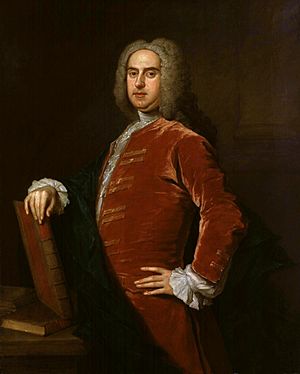Nathaniel Hooke facts for kids
Quick facts for kids
Nathaniel Hooke
|
|
|---|---|

Nathaniel Hooke by Bartholomew Dandridge
|
|
| Died | 19 July 1763 Cookham, Berkshire
|
| Academic background | |
| Alma mater | Twyford School |
Nathaniel Hooke (born around 1687 – died 19 July 1763) was an English historian. He is best known for his important work, Roman History. He also helped famous people write their life stories.
Contents
The Early Life of Nathaniel Hooke
Nathaniel Hooke was the oldest son of John Hooke. His father was a special kind of lawyer called a serjeant-at-law. Nathaniel was also the nephew of another Nathaniel Hooke, who was a soldier who supported the Jacobite cause. The Jacobites wanted King James II and his family to rule England again.
It is believed that Nathaniel Hooke studied at Twyford School. There, he might have become good friends with the famous poet Alexander Pope. This friendship lasted throughout their lives.
Hooke's Education and Early Career
In 1702, Hooke was accepted into Lincoln's Inn. This was a place where people trained to become lawyers.
Later, he faced financial difficulties because of something called the South Sea Bubble. This was a big economic event where many people lost money. Because of this, Hooke looked for support from important people.
He dedicated a book he translated to the Earl of Oxford. This book was about the life of a French writer named Fénelon. It was published in 1723.
Working with Famous People
Nathaniel Hooke worked with many important people of his time. These included the Earl of Marchmont, Richard Onslow, and his friend Alexander Pope.
Helping the Duchess of Marlborough
One of Hooke's most famous jobs was helping Sarah Churchill, Duchess of Marlborough. She was a very powerful and wealthy woman. She wanted help writing her memoirs, which are her life memories.
Hooke was recommended to her. He visited the Duchess, who was quite old at the time. She spoke to him for many hours without stopping. Hooke lived in her house until the book was finished.
The book was published in 1742. It was called An Account of the Conduct of the Dowager Duchess of Marlborough from her first coming to Court to the year 1710. For his work, the Duchess paid Hooke a large sum of money, £5,000.
Friendship with Alexander Pope
Nathaniel Hooke was a close friend of the poet Alexander Pope. When Pope was dying, it was Hooke who brought a Roman Catholic priest to him. This was so Pope could confess his sins.
Hooke was also friends with Martha Blount, another person close to Pope. She left a gift in her will to Hooke's daughter, Elizabeth.
Nathaniel Hooke passed away on 19 July 1763. He died in Cookham, Berkshire. He was buried in the churchyard at Hedsor. A special stone with a Latin message was placed there in his memory.
Nathaniel Hooke's Writings
Nathaniel Hooke was known as a deep thinker. Alexander Pope believed that Hooke was one of the best writers of prose (regular writing, not poetry) of his time.
The Roman History
Hooke's most important work was his Roman History. It covered the history of Rome from when it was founded until the end of the Roman Republic. This work was published in four volumes between 1738 and 1771.
Hooke got the idea for this book while working on an index for another Roman history book. The first volume of his Roman History was dedicated to his friend, Alexander Pope.
The second volume included important lists of Roman officials called the Fasti Capitolini. These lists were found in Rome in 1545. The third volume was printed while Hooke was alive but published after he died. The fourth volume was published in 1771 by another writer. This important work was printed many times over the years.
Other Notable Works
Hooke also translated other books from French into English. One of these was 'Travels of Cyrus, with a Discourse on Mythology,' published in 1739.
He also wrote 'Observations' in 1758. This book discussed different ideas about the Roman Senate. The Roman Senate was a powerful governing group in ancient Rome.
Another work by Hooke was 'Six Letters to a Lady of Quality.' These letters were about finding religious peace. They were first printed in a collection of writings in 1791 and then separately in 1816.
Hooke also helped to improve a translation of Antonio de Solís's History of the Conquest of Mexico by the Spaniards in 1753.
Nathaniel Hooke's Family
Nathaniel Hooke had two sons. One was named Thomas Hooke, who became a rector and a vicar (types of church leaders). His other son was Luke Joseph Hooke.
Nathaniel also had a daughter named Jane Mary Hooke. She passed away on 28 April 1793 and was buried in the same churchyard as her father in Hedsor.
 | William L. Dawson |
 | W. E. B. Du Bois |
 | Harry Belafonte |

